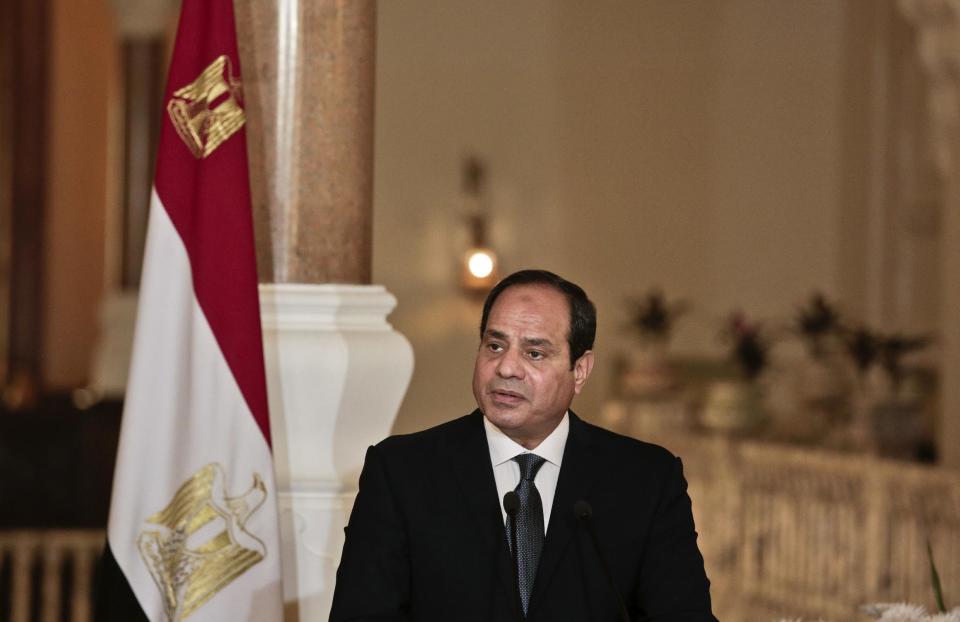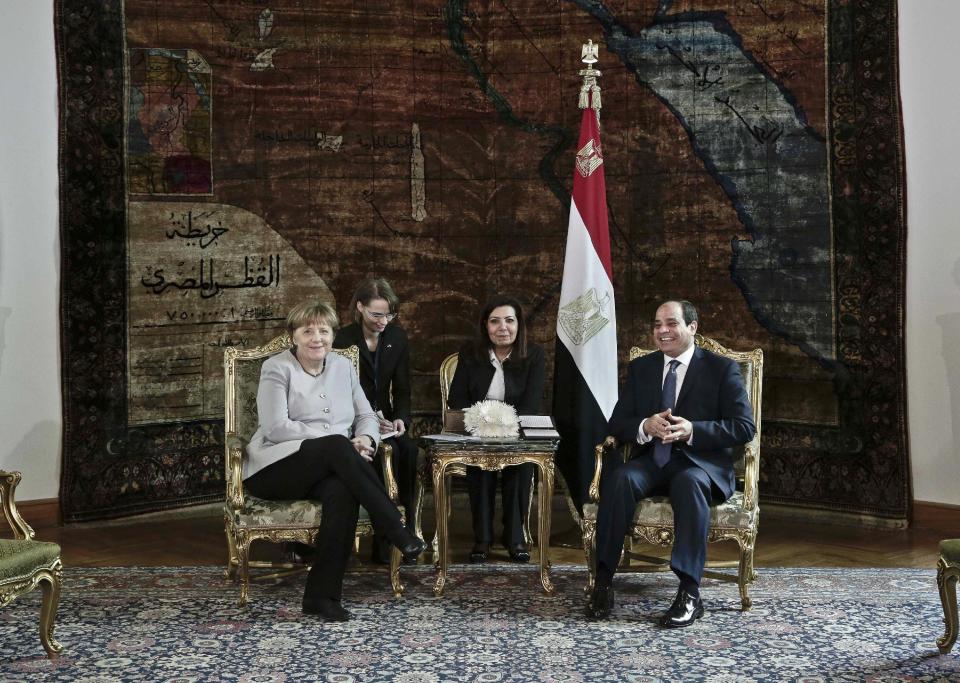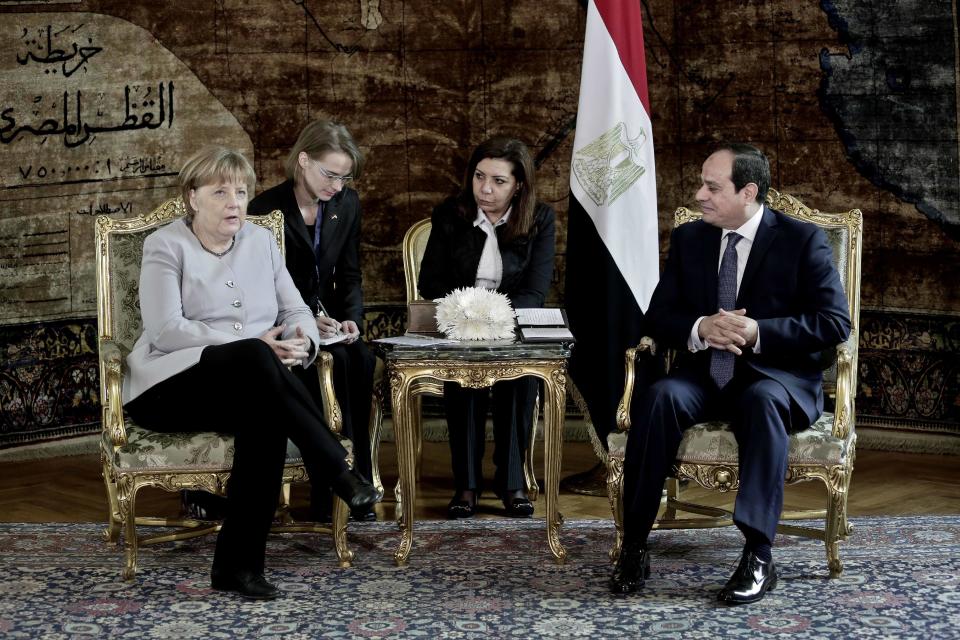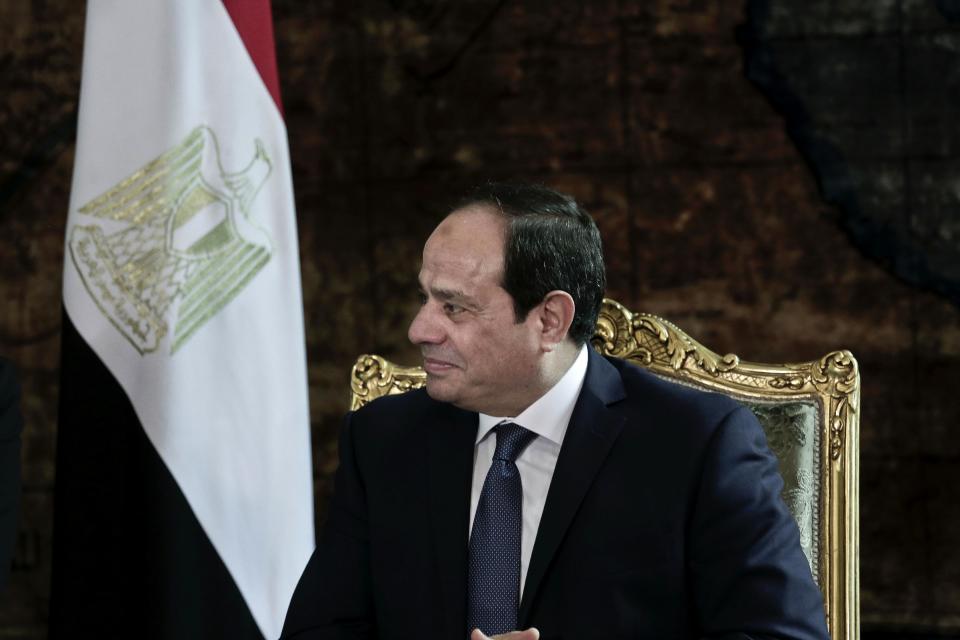Merkel visits Egypt with eye on stemming migration
CAIRO (AP) — German Chancellor Angela Merkel on Thursday pledged to boost support for Egypt's economic development and partner with Cairo to help address the region's refugee crisis, with an eye on stemming the flow of migrants to Europe.
After meeting President Abdel-Fattah el-Sissi, Merkel told reporters she had discussed providing assistance and equipment to stop human traffickers from using Egypt as a transit country. Neither leader provided further details.
"There are a variety of refugees in Egypt, and we would like these refugees to have better opportunities — as Egypt faces a big challenge, we are discussing concrete points," she said at a joint news conference in the presidential palace. "We can imagine further support but have not reached this point yet."
Germany wants to help Egypt strengthen its coast guard and crack down on illegal trafficking across the Mediterranean, where thousands of migrants die at sea each year. Hundreds of thousands of refugees and migrants have entered Europe in recent years.
"Egypt has made proposals for technical support that also must be further discussed, but I think that when it has to do with border security, Germany is very ready to deliver support," Merkel said.
Merkel's visit was her first visit to the country in a decade. She later met with Muslim and Christian leaders and is to meet civil society representatives before heading to Tunisia on Friday.
She is believed to be seeking a deal similar to the one reached between the European Union and Turkey in which Ankara blocks migrants and refugees from traveling onward to Europe in exchange for economic aid. Egypt has so far rejected the idea, but el-Sissi said it was a topic for negotiation.
"Of course we must take measures in Egypt, and as a transit land we must make more efforts," he said. "As for camps, in Egypt we don't have any camps or ghettos for refugees... This point I would not really discuss until our talks are at the final decisions."
Human Rights Watch last week described Merkel's visit as part of a European effort to "externalize responsibility for migrants and asylum seekers."
"Ensuring safe and swift returns of Tunisians and Egyptians who are not in need of protection is legitimate, as long as the procedures are fair," said Judith Sunderland, associate Europe and Central Asia director for the New York-based rights group.
"It's another thing entirely to pursue dodgy deals that could trap asylum seekers and migrants from elsewhere in countries like Tunisia and Egypt that cannot guarantee decent treatment or meaningful access to asylum."
Merkel said she also discussed human rights with el-Sissi, and reached an additional protocol for the work of civil society groups in Egypt, without getting into specifics.
Germany's Konrad Adenauer Stiftung, a non-governmental organization linked to Merkel's political party, was shut down by Egyptian security forces in 2011, with its German director and Egyptian employees later sentenced to prison time in absentia. The issue had been a minor sore point in relations, which Germany raised on previous occasions but never managed to resolve.
"I am very happy we were able to make progress with our political foundations," Merkel said. "It is an important step on the way to more diversity in civil society."
The Egyptian government has waged a wide-scale crackdown on dissent since the military overthrew an elected Islamist president in 2013. Thousands have been jailed since then, and the government has banned all unauthorized protests. NGOs can be shut down arbitrarily, as was the case with the Nadeem Center, which offers therapy for torture victims and documents police abuse.
El-Sissi said his government is working on striking a "balance between human rights and security measures" as it confronts terrorism. He suggested that Germany would have taken similar action if it faced "the same threats and attacks."
An Islamic State affiliate based in the northern Sinai Peninsula has carried out scores of attacks in recent years, mainly targeting Egyptian security forces. A recent wave of attacks on Christians in northern Sinai led hundreds to flee.
Merkel's delegation includes several German CEOs who discussed investment opportunities during the meeting with el-Sissi, who is struggling to jumpstart the economy after years of unrest.
The two leaders and the businessmen also viewed via video feed the inauguration of a Siemens megaproject to build three new power plants in Egypt. Siemens signed an 8 billion euro deal with Cairo two years ago that aims to boost Egypt's power generation capacity by around 50 percent by May 2018.











